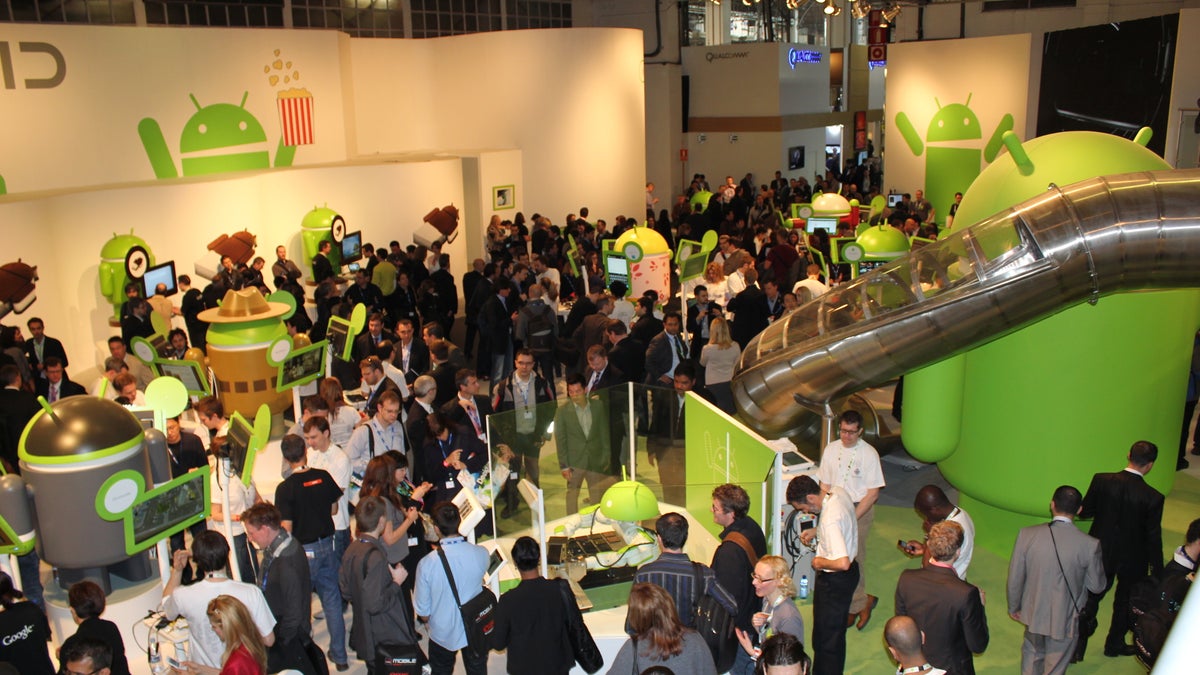Google's ninja approach to Mobile World Congress
In a break from the last two years, Google has opted for a more subdued approach, complete with mysterious meeting room.

BARCELONA, Spain--Gone is the giant Android figures, the twisty slide, colorful pins, and free ice cream sandwiches. Gone is the massive, head-turning booth that clearly established Google as a major player at Mobile World Congress.
In its place is a small meeting room with a blank glass placard on the outside. A white curtain provides privacy for the briefings inside.
Google has largely run under the radar, taking a few meetings with the press, vendors, and other partners at the show. But the company isn't listed as an exhibitor, and its name and meeting room doesn't appear on convention maps.
Google's decision to take stealthlike approach at the show is a curious shift in tactic, especially considering the influence it now has over the entire wireless industry. There are few companies at the show that isn't at least indirectly affected by Android.
Curiously, its non-presence at the show may be the best illustration of Google's reach.
"If you walk around the halls, there's a lot of Android out there already," said Hiroshi Lockheimer, vice president of engineering in charge of Android. "We felt like the partners are best equipped to talk about their products.
"We're here to meet with people. We don't need a fancy booth for this."
Google's virtual absence at the show certainly doesn't mean that the company and Android weren't in the headlines. The Wall Street Journal reported on the growing tensions between Google and Samsung. Samsung, meanwhile, poured cold water on everyone else as the show was kicking off by sending out invitations to the launch event for the Galaxy S4 -- the premier Android phone.
Many of the big products shown off, from the Samsung Galaxy Note 8 to the
Just look at its market share. In the fourth quarter, Android accounted for 70.1 percent of smartphones shipped, according to IDC. The second closest, Apple, accounted for 21 percent, and the rest trail off pretty dramatically.
Of course, some things remained the same. Google continued to host its annual Android party, one of the hotter tickets at Mobile World Congress. This year Florence and the Machine and Tinie Tempah rocked a trendy club in Barcelona. Lockheimer quipped that Google spent all its money on the party this year.
"Do we want Florence and the Machine or a booth?"
Still, it's a far cry from the splashy presence the company has opted for in the past few shows. Last year, Google elicited a Pokemon, "gotta catch 'em all"-like craze with show goers by releasing a series of different Android pins that could be found at partner booths.
The booth was anything but conventional, featuring lots of colors, a slide, a mini parade of Android phones, and a sandwich bar that delivered -- what else? -- ice cream sandwiches. It was a popular destination for show goers and consistently packed.
Google's large presence was particularly noteworthy given its tendency to shun other large trade shows such as Consumer Electronics Show or CTIA Wireless. Like Apple, it opts to hold its own events, such as the developer-focused Google I/O.
But its more subdued approach at Mobile World Congress signals that Google, and Android, may be growing up.

